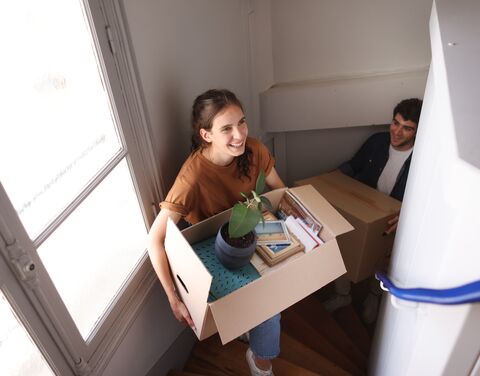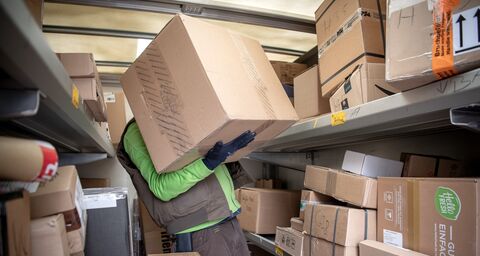
Checklist for moving
Moving makes people both excited and nervous at the same time. Because no matter how much you are looking forward to your new home, it is still a very challenging undertaking. Our checklist will help you make the best use of the time leading up to your moving date.
If you’ve ever moved before, you'll know that the most challenging part of a move is all those little things you have to think about. Good planning is key. So we are here to lend a hand so you can focus on the good parts. Our moving checklist takes you step-by-step through the time leading up to the day of your move. This way you can work through everything, item by item – from the long-term to-dos to all those last-minute tasks.
Initial preparation for the move
Being well prepared is half the work! Why? Because there are so many things that you can easily organize months before your moving day. This is one of our key tips: Everything that you can do in advance should be done in advance. Because on the day of your move, you can be sure that plenty of unforeseen things will pop up that you need to attend to. Here is our checklist for phase 1 of a stress-free move:
Administrative tasks
- Advertise your apartment to find a suitable new tenant – platforms such as newhome can help you with this.
- Request to take your legal moving day off work as well as any additional vacation days. Inform the school authorities, childcare and other such places as soon as possible.
- Set up a budget for your move: How much can you afford? And how much do you want to spend? Should your move be as easy as possible or as cheap as possible – or somewhere in between?
- Notify your landline network provider and Internet provider.
Practical tasks:
- There's no better time to get rid of unwanted items than now! Go through your attic, cellar, apartment, balcony and garden and clear out the things you no longer need. Everything that you sell, donate or recycle now will save you the hassle of having to pack and move it. And another thing: You should start using up emergency rations such as frozen food.
- Take a good hard look at your apartment. Has anything been damaged? Do you have to return anything to its original state, like repainting the walls? Do you have all the keys that are listed in your rental contract? Notify the building superintendent and your personal liability insurer in good time. You can take care of small repairs yourself.
- Study the layout of your future apartment, or even better, set up an appointment to go see it to take measurements. Draw up a furnishings plan. What will go where? What important pieces of furniture are you lacking? Take note of any orders that have long delivery times.
Organizational tasks
- Plan transportation for your household belongings: Are you going to hire a moving company? Or will you do it yourself? If you don’t hire a mover, then take the time now to find enough helpers and rent suitable vehicles and trailers.
- Decide on who will clean your old apartment: Will you hire a cleaning company that offers a guarantee, or will you do it yourself with your family and friends? If you’re doing it yourself, then you should factor in more time and more people than you think you will need. If you finish faster than expected, everyone will be happy.
- Contact both the current and future tenants of both properties: Who will do what and under what conditions?Put everything in writing and send a copy to the building supervisor.
Tasks for the month of your move
Just a few more weeks now! You can hardly wait to move into your new apartment. But until then, you still have a lot to do. Here is the checklist for the month that you move in:
Administrative tasks
- Now is the time to change your address. You can usually do this online: banks and PostFinance, utilities, employers, schools, tax authorities and the DMV, phone providers and subscriptions, insurance companies, doctors and dentists, online shops and home delivery services, family and friends, etc.
Tip: Instruct Swiss Post to forward mail to your new address. - Review your insurance situation or make an appointment for a consultation. Maybe you need to make changes to your policies: Estimate the value of your household belongings with our sum insured calculator (in German). Pay attention to your health insurance – your move may involve changing your premium region.
- Update your standing orders: rent, parking space, hobby room, associations, childcare, etc.
Practical tasks
- Start collecting enough packing materials such as moving boxes, bubble wrap and moving blankets. Other helpful items include bungee cords and work gloves as well as slip-free mats to cover delicate floors. Now is the time to start filling boxes: first pack up what you will not be using in the next few weeks and then gradually pack up the rest. List the contents on each box
- Weight: Make a note on particularly heavy boxes. It’s best to combine heavy or oddly shaped items with fluffy and soft items. This saves both your back and packing materials.
- Content: What’s in the box? Is it fragile or does it go a certain way up?
- Destination: What goes where in your new apartment? Mark everything with colors, numbers or letters to make it easier for those helping you to figure out where things go. If you tape a piece of paper over the long edge of the box, then you can see what you’ve written when the box is stacked or being carried.
- Gradually disassemble your furniture – start with the items you need the least, and make sure the pieces are packed well. Put small accessories and screws into plastic bags and tape them directly to the furniture itself. There is nothing more frustrating than trying to reassemble furniture without having all the little parts you need!
- Put together your own personal moving kit so that on the day of your move you have everything you need:
- A well-stocked toolbox – this can be a total game changer on moving day! Get some spackling to fill small holes in the walls. Depending on the time of year, you may need to bring flashlights, battery-operated lights and headlamps to tide you over during the last moments in your old apartment and to use as provisional lighting in your new apartment.
- If you are doing the cleaning yourself, then gather cleaning tools and cleaners (including denatured alcohol), scrub brushes (including old toothbrushes), sponges, spot erasers, rags, hand towels, paper towels and rubber gloves. Put other cleaning tools such as vacuum cleaners, mops, feather dusters, stepladders, etc. in a safe place and label them so eager movers don’t take them away before you've used them.
- Small first-aid kit and a box of useful items such as a notebook, Post-its, waterproof markers and tape, scissors and a kitchen knife, string and zip ties, work gloves and rubber gloves, trash bags and toilet paper, extension cords, etc.
Organizational tasks
- Clarify the parking situation for both the old and the new apartment. You may need to get a parking permit or apply to have parking restricted. Inform your neighbors on both ends about when you’re moving and elevator use, etc.
- Plan the day of your move in as much detail as possible.
- Allocating tasks: Who will be moving furniture and boxes? Who will be loading the vehicles? Who will be assembling the new furniture? Who will install the lighting? By asking your helpers to do specific tasks, you are also reminding them to show up so no one forgets.
- Signage: Make simple signs to designate areas for the basement, the attic, the various rooms in your apartment and the “unloading zones.” If all your boxes are stacked in the right location after they have been unloaded, it will save you a lot of work later on.
- Food and drink: Your helpers need enough drinks and some good food to keep up their morale up while doing such tiring work. Use a delivery service for lunch. Order in advance!
- Organize a babysitter for your kids and/or pets so you can concentrate on what needs to be done. Ideally find someone who can keep them overnight.
You’re almost there!
Moving day is around the corner. After all the planning and preparations, you can’t wait to move into your new home. But despite all the excitement, try to concentrate on getting all the last little details done. And the night before the move, go to bed early. You’ll need all your energy.
Things to do the day before
- Pack a bag for yourself with things you’ll need the day of the move and your first night: A change of clothes and shoes, hand towel and toiletries, food and drinks, wallet and phone, charging cable and your keys. Keep this bag someplace safe, such as the passenger seat of your car.
- Make sure to get food for your moving team. Moving makes you hungry! In addition to lunch, plan a large morning and afternoon snack break with a lot of rehydrating drinks (don’t forget the glasses). Also have small snacks on hand to pass out as needed to boost both mood and energy levels.
- Pack the last boxes. And yes, the last ones are always the worst because they contain a mystifying array of odds and ends that are left over because they really don’t belong anywhere. But after that very last box is sealed, you’re done! Take a last walk through the apartment and tape the drawers and doors of small furniture shut.
Tips for moving day
- Get up early enough to enjoy a hearty breakfast and take care of the final preparations, such as hanging up a floor plan and signs at the new apartment to help everyone find their way around.
- Take time to welcome your moving team.Give everyone a good 15 minutes to enjoy their coffee and croissants. Naturally you can also use this time to give them instructions and assign tasks. Having everyone all start together boosts motivation and team spirit.
- Today you should focus on coordinating. Questions are surely to pop up quite frequently. Being there for your helpers is more important than trying to load and unload as much as possible yourself. A move is actually an excellent opportunity to practice the art of delegation.
Vehicle overloaded?
If you are moving yourself, pay attention to the maximum weight limits for vehicles (permissible total weight minus empty weight). Especially for vehicles equipped with ramps, the inside may still be half empty when the maximum weight has been reached. By overloading the vehicle, you are running a security risk and taking on the consequences that go with it:
- If the vehicle is overweight by no more than 5%, you could be fined up to CHF 200.
- If this weight is exceeded, you could additionally face a penalty order complete with proceeding costs.
- The person driving the vehicle is responsible and they risk losing their license.
You’re done!
After all this work comes a great wave of both relief and exhaustion. Take some time to recover and relax. You shouldn’t be in a rush to set up your new place. Don’t put unnecessary pressure on yourself to make everything perfect right away. Remember that moving day was a sprint – but the whole move, from the preparation beforehand to all the unpacking and organizing afterwards, is a marathon. Plan your energies accordingly. This is especially true for families with children. Practice taking breaks amid the chaos.
Administrative tasks after you move
- Report damages or defects that occurred during the move.
- If any complaints of damage to your old apartment were made when you moved out, send the list to your personal liability insurer right away.
- If the moving company damaged any of your belongings, notify them by certified letter within 3 days.
- If you notice defects in your new place, send a list to the building supervisor within 14 days. It’s a good idea to take a meter reading (electricity, heating, hot water, etc.) when you first move in.
- Contact your local residents’ registration office(s) to register and de-register. You have 14 days to do this. The majority of Swiss municipalities now let you do this online.
- Has your previous landlord returned your security deposit? Give them a little while and then check your account to see if the deposit is there.







